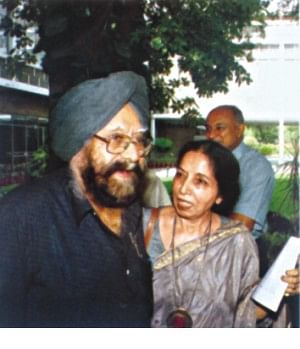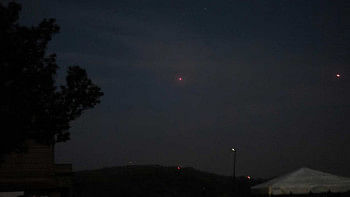Meeting Khushwant Singh : Delhi Part 2

Khushwant Singh and Ajeet Cour
I was running late. I was due for an afternoon tea with Veena Sikri, the ex-Indian High Commissioner to Bangladesh at the India International Center, after which I was to meet Khushwant Singh at his house. Who, as is well known throughout India, is notoriously finicky about guests arriving and leaving on time. Ajeet Caur, the head of SAARC's cultural and literary wing, had set up the meet with an accompanying reminder: "It was difficult.You go to his house at 7:00, and you leave promptly at 7:30." Fine with me, I had thought, since I just wanted to see him up close, not badger him with some set of questions.
But I had not accounted for Delhi's rush hour traffic, which can get as bad as Dhaka's. Stuck in a three-wheeler amid blaring horns and stalled cars, my cell phone rang. Which had been generously lent by an event manager for SAARC's folklore festival ("Aray lay lo yaar, you give back when you finished, na! Only do top up, no?").
"Yes, Veena, I'm almost there," I lied into my mobile.
No way was I even close! But thank the good Lord for human lust and avarice, as Khushwant has said over and over again. I leaned across and informed the driver that some extra bucks would be his if he did jaldi quick double time. He responded with an afterburners-on, crash-and-burn zigzagging sprint that careened down side roads and spun through traffic roundabouts to finally crash past the startled gatekeepers of the very staid IIC establishment. I clambered out wild-eyed to face a broad paan-stained grin, which got broader as I yanked out notes from my wallet and paid without counting. Jesus, let this bugger loose in the Indy 500, he could wrap up it up in his sleep!
After a pleasant chat with Veena, who told me to convey her best wishes to 'Mahfuz and Zafar' back at The Daily Star (something I have yet to do), she dropped me off at Khushwant Singh's Sujan Singh Park apartment complex, close by the IIC. I thanked her, got out and went inside the building. It was still three minutes to 7:00, and I waited till it was a minute to, then rang the bell.
I stepped inside to a drawing room with high ceilings, into a hum of conversation arising from the several people gathered there. In a corner easy chair sat Khushwant with a laprobe on his legs. It was a plainly furnished room, with old, beat-up chairs and cushioned wooden sofas. Simple whitewashed walls, with some cobwebs and mildew stains up on the corners. I guess when you are Khushwant Singh you can live however you wish. His father Sobha Singh, once Delhi's construction king, had built most of the city that surrounded Lutyen's Raj center. Khushwant looked frailer than in his photos, but sharp-eyed. I introduced myself, and he shook hands. "From Bangladesh, yes, Ajeet had told me," he said, and cordially bade me to sit down. A burly Sikh in a shiny blue suit promptly got up from near him and made way for me. Several bottles of whiskey occupied a side table. He looked at me curiously, and asked how long I had been in Delhi. I told him. His voice was gentle. Adjoining the drawing room was what normally would be a dining room space, but it was empty. "A drink?" Khushwant asked. How do you say no to the Grand Old Man of Delhi? So somebody handed me one, and a lady who said she was Khushwant's neighbour, an Assamese, came over to sit by me and recount her experiences of working in the Calcutta refugee camps during the 1971 war.
The mention of 1971 perked up Khushwant. "You know," he said to me, "I went to Bangladesh just after the war to report for The New York Times -- in an Indian Air Force transport plane." I said I had read about his going in his autobiography Truth, Love & A Little Malice, but he had written little else about Bangladesh there. He shrugged and didn't say anything. Bangladesh did come up in the book in the context of a Khushwant visit to Pakistan and meeting with Tikka Khan, who angrily denied charges of genocide by his forces. Suddenly, though, he turned to me and said that near the end of that stay in Bangladesh he became aware of a change in the public mood about India. During a visit to Shantosh to see Maulana Bhashani, he asked the latter about it. The Maulana told him that the Indian army had taken away even ceiling fans from Bangladesh, and that had soured the public mood. Khushwant said to me "I was simply dumbfounded to hear it from the Maulana's lips, since after all very many Indians had laid down their lives to liberate Bangladesh from the Pakistanis. Now ceiling fans?" I looked at him. "I didn't say anything back to the maulana," he responded. "Ceiling fans?" he said again, then shrugged and looked away.
It was pleasant in that warm room. People plainly ministered to him, hanging on his words. I was talking with an assistant editor of Outlook magazine I had met at a book launch previously when I became aware that it was getting close to 7:30. I rose to leave, but Khushwant waved me back down on the sofa. "Sit down," he murmured. "From Bangladesh. You are a two-Scotch guest. Have one more, and then you have to excuse this buddha, who goes to sleep early." I sat down again, was handed another drink and began talking with Rahul Singh, Khushwant's son, who himself is a writer and journalist based in Mumbai.
But what I was really thinking about was the Khushwant shrug and the 'ceiling fan' comment. No doubt it had rankled him that Bangladeshis could so quickly forget how much India had aided them in their liberation war. Had I not grown up in Pakistan, amid Sindhis, Pathans, Punjabis, UPmigrants and Balochis, his comment and shrug would have passed me by - it had been so subtly understated. Though Khushwant was a committed liberal humanist, I wondered if the experience had reinforced ideas non-Bengali Indians have about excitable, fickle Bengalis. The real South Asia, despite political boundaries, is a collection of ethnic communities bound firmly in other ways, not the least in their collective unconscious about the Other. We Bongs do it too. Very frequently, in a 1971 liberation war story penned by a Bangladeshi, when the Pakistan Army is heading towards a town or neighbourhood, Bengalis run away screaming 'Paanjabi aitasay, Paanjabi aitasay.' But there were Baloch and Pathan regiments (not counting our homegrown Razakars), that did equal amounts of murder and rape. But in the construction of our grand liberation war narrative, the 'Paanjabi' stands for them all, for all the terror and barbarism of 1971. We South Asians do have an amazing diversity of languages and culture, but we can also be imprisoned within them, and even today it feels odd to think of English as our common linguistic link. And this is where I think that Khushwant's contribution is immense, in that while his deepest affection is for Urdu poetry, his unselfconscious, uncomplicated, uninhibited English writing, in a stream of books, magazines and columns, daily, weekly and monthly, demystified English, liberated it. In his hands English was a language like any other, to be used from writing the history of Sikhs to his wife's bathroom proclivities, from Indians having sex in train compartments to the horrors of communal violence. He made it declasse, de-Brahminized it. In Khushwant's world of English you can talk about anything, and not be particularly aware of the language.
"Ilish," Khushwant Singh asked me, "you guys still getting your ilish?" I told him that the haul this year had been particularly good. "The last time I was in Bangladesh, Hasna Moudud fed me the finest cooked hilsa fish I've ever eaten. It was very tasty." Where was Hasna now? he asked. "In London, as far as I know," I told him. He nodded, but ah, that hilsa! He almost smacked his lips. The buddha (old man), as he likes to call himself, is young in his responses and his conversation. In a recent answer to a question about afterlife, his first words were "That's bullshit." I told him that if he ever made it to Bangladesh again, I would get him some ilish, maybe not as tasty, but....
I had asked him how he now felt. "Still going at 92," he said, "I'm still writing every day." True. But now a lot of the material were now merely being brought out in his name, such as the latest two from Penguin, Celebrating Urdu Poetry (which contains his translations of Urdu poetry, something he has done on and off over the years), and The Khushwant Singh Treasury (which is a collection of his favourite prayers, poems and proverbs). The latter typically mixes Shakespeare sonnets with anonymous contributions:
The sexual life of the camel
Is stranger than anyone thinks
In the heat of passion
He tries to bugger the Sphinx.
But the Sphinx's rear orifice
Is full of the sand of the Nile
Which explains the hump on the camel
And the Sphinx's mysterious smile.
As I finished my second drink, the bluesuited Sikh, evidently on the hunt for yet another interview of the great man, moved in on Khushwant. But Lady Luck was not with him. With a noticeable scowl, Khushwant said, "Enough now, this buddha needs his rest. So goodnight." I shook his hand, thanked him for his courtesy, waved at Rahul and got out of the door along with the rest of the crowd.
A three-wheeler back to the IIC? I shuddered, but not due to the Delhi cold. A brisk walk would do me no harm. Pulling my muffler tighter across my throat, I set off, past the apartment complex gates, onto the footpath, and into the wide, grinning night.
Khademul Islam is literary editor, The Daily Star.

 For all latest news, follow The Daily Star's Google News channel.
For all latest news, follow The Daily Star's Google News channel. 



Comments